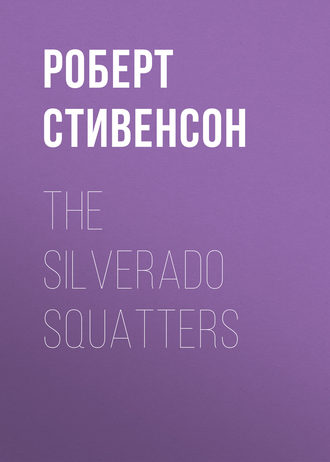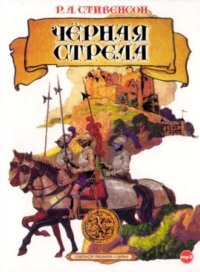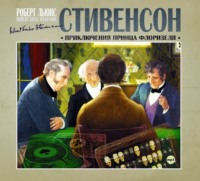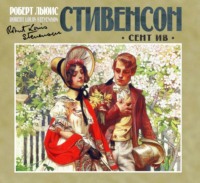 полная версия
полная версияThe Silverado Squatters
Meanwhile the wine is merely a good wine; the best that I have tasted better than a Beaujolais, and not unlike. But the trade is poor; it lives from hand to mouth, putting its all into experiments, and forced to sell its vintages. To find one properly matured, and bearing its own name, is to be fortune’s favourite.
Bearing its own name, I say, and dwell upon the innuendo.
“You want to know why California wine is not drunk in the States?” a San Francisco wine merchant said to me, after he had shown me through his premises. “Well, here’s the reason.”
And opening a large cupboard, fitted with many little drawers, he proceeded to shower me all over with a great variety of gorgeously tinted labels, blue, red, or yellow, stamped with crown or coronet, and hailing from such a profusion of clos and chateaux, that a single department could scarce have furnished forth the names. But it was strange that all looked unfamiliar.
“Chateau X – ?” said I. “I never heard of that.”
“I dare say not,” said he. “I had been reading one of X – ’s novels.”
They were all castles in Spain! But that sure enough is the reason why California wine is not drunk in the States.
Napa valley has been long a seat of the wine-growing industry. It did not here begin, as it does too often, in the low valley lands along the river, but took at once to the rough foot-hills, where alone it can expect to prosper. A basking inclination, and stones, to be a reservoir of the day’s heat, seem necessary to the soil for wine; the grossness of the earth must be evaporated, its marrow daily melted and refined for ages; until at length these clods that break below our footing, and to the eye appear but common earth, are truly and to the perceiving mind, a masterpiece of nature. The dust of Richebourg, which the wind carries away, what an apotheosis of the dust! Not man himself can seem a stranger child of that brown, friable powder, than the blood and sun in that old flask behind the faggots.
A Californian vineyard, one of man’s outposts in the wilderness, has features of its own. There is nothing here to remind you of the Rhine or Rhone, of the low côte d’or, or the infamous and scabby deserts of Champagne; but all is green, solitary, covert. We visited two of them, Mr. Schram’s and Mr. M’Eckron’s, sharing the same glen.
Some way down the valley below Calistoga, we turned sharply to the south and plunged into the thick of the wood. A rude trail rapidly mounting; a little stream tinkling by on the one hand, big enough perhaps after the rains, but already yielding up its life; overhead and on all sides a bower of green and tangled thicket, still fragrant and still flower-bespangled by the early season, where thimble-berry played the part of our English hawthorn, and the buck-eyes were putting forth their twisted horns of blossom: through all this, we struggled toughly upwards, canted to and fro by the roughness of the trail, and continually switched across the face by sprays of leaf or blossom. The last is no great inconvenience at home; but here in California it is a matter of some moment. For in all woods and by every wayside there prospers an abominable shrub or weed, called poison-oak, whose very neighbourhood is venomous to some, and whose actual touch is avoided by the most impervious.
The two houses, with their vineyards, stood each in a green niche of its own in this steep and narrow forest dell. Though they were so near, there was already a good difference in level; and Mr. M’Eckron’s head must be a long way under the feet of Mr. Schram. No more had been cleared than was necessary for cultivation; close around each oasis ran the tangled wood; the glen enfolds them; there they lie basking in sun and silence, concealed from all but the clouds and the mountain birds.
Mr. M’Eckron’s is a bachelor establishment; a little bit of a wooden house, a small cellar hard by in the hillside, and a patch of vines planted and tended single-handed by himself. He had but recently began; his vines were young, his business young also; but I thought he had the look of the man who succeeds. He hailed from Greenock: he remembered his father putting him inside Mons Meg, and that touched me home; and we exchanged a word or two of Scotch, which pleased me more than you would fancy.
Mr. Schram’s, on the other hand, is the oldest vineyard in the valley, eighteen years old, I think; yet he began a penniless barber, and even after he had broken ground up here with his black malvoisies, continued for long to tramp the valley with his razor. Now, his place is the picture of prosperity: stuffed birds in the verandah, cellars far dug into the hillside, and resting on pillars like a bandit’s cave: – all trimness, varnish, flowers, and sunshine, among the tangled wildwood. Stout, smiling Mrs. Schram, who has been to Europe and apparently all about the States for pleasure, entertained Fanny in the verandah, while I was tasting wines in the cellar. To Mr. Schram this was a solemn office; his serious gusto warmed my heart; prosperity had not yet wholly banished a certain neophite and girlish trepidation, and he followed every sip and read my face with proud anxiety. I tasted all. I tasted every variety and shade of Schramberger, red and white Schramberger, Burgundy Schramberger, Schramberger Hock, Schramberger Golden Chasselas, the latter with a notable bouquet, and I fear to think how many more. Much of it goes to London – most, I think; and Mr. Schram has a great notion of the English taste.
In this wild spot, I did not feel the sacredness of ancient cultivation. It was still raw, it was no Marathon, and no Johannisberg; yet the stirring sunlight, and the growing vines, and the vats and bottles in the cavern, made a pleasant music for the mind. Here, also, earth’s cream was being skimmed and garnered; and the London customers can taste, such as it is, the tang of the earth in this green valley. So local, so quintessential is a wine, that it seems the very birds in the verandah might communicate a flavour, and that romantic cellar influence the bottle next to be uncorked in Pimlico, and the smile of jolly Mr. Schram might mantle in the glass.
But these are but experiments. All things in this new land are moving farther on: the wine-vats and the miner’s blasting tools but picket for a night, like Bedouin pavillions; and to-morrow, to fresh woods! This stir of change and these perpetual echoes of the moving footfall, haunt the land. Men move eternally, still chasing Fortune; and, fortune found, still wander. As we drove back to Calistoga, the road lay empty of mere passengers, but its green side was dotted with the camps of travelling families: one cumbered with a great waggonful of household stuff, settlers going to occupy a ranche they had taken up in Mendocino, or perhaps Tehama County; another, a party in dust coats, men and women, whom we found camped in a grove on the roadside, all on pleasure bent, with a Chinaman to cook for them, and who waved their hands to us as we drove by.
CHAPTER IV – THE SCOT ABROAD
A few pages back, I wrote that a man belonged, in these days, to a variety of countries; but the old land is still the true love, the others are but pleasant infidelities. Scotland is indefinable; it has no unity except upon the map. Two languages, many dialects, innumerable forms of piety, and countless local patriotisms and prejudices, part us among ourselves more widely than the extreme east and west of that great continent of America. When I am at home, I feel a man from Glasgow to be something like a rival, a man from Barra to be more than half a foreigner. Yet let us meet in some far country, and, whether we hail from the braes of Manor or the braes of Mar, some ready-made affection joins us on the instant. It is not race. Look at us. One is Norse, one Celtic, and another Saxon. It is not community of tongue. We have it not among ourselves; and we have it almost to perfection, with English, or Irish, or American. It is no tie of faith, for we detest each other’s errors. And yet somewhere, deep down in the heart of each one of us, something yearns for the old land, and the old kindly people.
Of all mysteries of the human heart, this is perhaps the most inscrutable. There is no special loveliness in that gray country, with its rainy, sea-beat archipelago; its fields of dark mountains; its unsightly places, black with coal; its treeless, sour, unfriendly looking corn-lands; its quaint, gray, castled city, where the bells clash of a Sunday, and the wind squalls, and the salt showers fly and beat. I do not even know if I desire to live there; but let me hear, in some far land, a kindred voice sing out, “Oh, why left I my hame?” and it seems at once as if no beauty under the kind heavens, and no society of the wise and good, can repay me for my absence from my country. And though I think I would rather die elsewhere, yet in my heart of hearts I long to be buried among good Scots clods. I will say it fairly, it grows on me with every year: there are no stars so lovely as Edinburgh street-lamps. When I forget thee, auld Reekie, may my right hand forget its cunning!
The happiest lot on earth is to be born a Scotchman. You must pay for it in many ways, as for all other advantages on earth. You have to learn the paraphrases and the shorter catechism; you generally take to drink; your youth, as far as I can find out, is a time of louder war against society, of more outcry and tears and turmoil, than if you had been born, for instance, in England. But somehow life is warmer and closer; the hearth burns more redly; the lights of home shine softer on the rainy street; the very names, endeared in verse and music, cling nearer round our hearts. An Englishman may meet an Englishman to-morrow, upon Chimborazo, and neither of them care; but when the Scotch wine-grower told me of Mons Meg, it was like magic.
“From the dim shieling on the misty islandMountains divide us, and a world of seas;Yet still our hearts are true, our hearts are Highland,And we, in dreams, behold the Hebrides.”And, Highland and Lowland, all our hearts are Scotch.
Only a few days after I had seen M’Eckron, a message reached me in my cottage. It was a Scotchman who had come down a long way from the hills to market. He had heard there was a countryman in Calistoga, and came round to the hotel to see him. We said a few words to each other; we had not much to say – should never have seen each other had we stayed at home, separated alike in space and in society; and then we shook hands, and he went his way again to his ranche among the hills, and that was all.
Another Scotchman there was, a resident, who for the more love of the common country, douce, serious, religious man, drove me all about the valley, and took as much interest in me as if I had been his son: more, perhaps; for the son has faults too keenly felt, while the abstract countryman is perfect – like a whiff of peats.
And there was yet another. Upon him I came suddenly, as he was calmly entering my cottage, his mind quite evidently bent on plunder: a man of about fifty, filthy, ragged, roguish, with a chimney-pot hat and a tail coat, and a pursing of his mouth that might have been envied by an elder of the kirk. He had just such a face as I have seen a dozen times behind the plate.
“Hullo, sir!” I cried. “Where are you going?”
He turned round without a quiver.
“You’re a Scotchman, sir?” he said gravely. “So am I; I come from Aberdeen. This is my card,” presenting me with a piece of pasteboard which he had raked out of some gutter in the period of the rains. “I was just examining this palm,” he continued, indicating the misbegotten plant before our door, “which is the largest spacimen I have yet observed in Califoarnia.”
There were four or five larger within sight. But where was the use of argument? He produced a tape-line, made me help him to measure the tree at the level of the ground, and entered the figures in a large and filthy pocket-book, all with the gravity of Solomon. He then thanked me profusely, remarking that such little services were due between countrymen; shook hands with me, “for add lang syne,” as he said; and took himself solemnly away, radiating dirt and humbug as he went.
A month or two after this encounter of mine, there came a Scot to Sacramento – perhaps from Aberdeen. Anyway, there never was any one more Scotch in this wide world. He could sing and dance, and drink, I presume; and he played the pipes with vigour and success. All the Scotch in Sacramento became infatuated with him, and spent their spare time and money, driving him about in an open cab, between drinks, while he blew himself scarlet at the pipes. This is a very sad story. After he had borrowed money from every one, he and his pipes suddenly disappeared from Sacramento, and when I last heard, the police were looking for him.
I cannot say how this story amused me, when I felt myself so thoroughly ripe on both sides to be duped in the same way.
It is at least a curious thing, to conclude, that the races which wander widest, Jews and Scotch, should be the most clannish in the world. But perhaps these two are cause and effect: “For ye were strangers in the land of Egypt.”
PART II – WITH THE CHILDREN OF ISRAEL
CHAPTER I. – TO INTRODUCE MR. KELMAR
One thing in this new country very particularly strikes a stranger, and that is the number of antiquities. Already there have been many cycles of population succeeding each other, and passing away and leaving behind them relics. These, standing on into changed times, strike the imagination as forcibly as any pyramid or feudal tower. The towns, like the vineyards, are experimentally founded: they grow great and prosper by passing occasions; and when the lode comes to an end, and the miners move elsewhere, the town remains behind them, like Palmyra in the desert. I suppose there are, in no country in the world, so many deserted towns as here in California.
The whole neighbourhood of Mount Saint Helena, now so quiet and sylvan, was once alive with mining camps and villages. Here there would be two thousand souls under canvas; there one thousand or fifteen hundred ensconced, as if for ever, in a town of comfortable houses. But the luck had failed, the mines petered out; and the army of miners had departed, and left this quarter of the world to the rattlesnakes and deer and grizzlies, and to the slower but steadier advance of husbandry.
It was with an eye on one of these deserted places, Pine Flat, on the Geysers road, that we had come first to Calistoga. There is something singularly enticing in the idea of going, rent-free, into a ready-made house. And to the British merchant, sitting at home at ease, it may appear that, with such a roof over your head and a spring of clear water hard by, the whole problem of the squatter’s existence would be solved. Food, however, has yet to be considered, I will go as far as most people on tinned meats; some of the brightest moments of my life were passed over tinned mulli-gatawney in the cabin of a sixteen-ton schooner, storm-stayed in Portree Bay; but after suitable experiments, I pronounce authoritatively that man cannot live by tins alone. Fresh meat must be had on an occasion. It is true that the great Foss, driving by along the Geysers road, wooden-faced, but glorified with legend, might have been induced to bring us meat, but the great Foss could hardly bring us milk. To take a cow would have involved taking a field of grass and a milkmaid; after which it would have been hardly worth while to pause, and we might have added to our colony a flock of sheep and an experienced butcher.
It is really very disheartening how we depend on other people in this life. “Mihi est propositum,” as you may see by the motto, “id quod regibus;” and behold it cannot be carried out, unless I find a neighbour rolling in cattle.
Now, my principal adviser in this matter was one whom I will call Kelmar. That was not what he called himself, but as soon as I set eyes on him, I knew it was or ought to be his name; I am sure it will be his name among the angels. Kelmar was the store-keeper, a Russian Jew, good-natured, in a very thriving way of business, and, on equal terms, one of the most serviceable of men. He also had something of the expression of a Scotch country elder, who, by some peculiarity, should chance to be a Hebrew. He had a projecting under lip, with which he continually smiled, or rather smirked. Mrs. Kelmar was a singularly kind woman; and the oldest son had quite a dark and romantic bearing, and might be heard on summer evenings playing sentimental airs on the violin.
I had no idea, at the time I made his acquaintance, what an important person Kelmar was. But the Jew store-keepers of California, profiting at once by the needs and habits of the people, have made themselves in too many cases the tyrants of the rural population. Credit is offered, is pressed on the new customer, and when once he is beyond his depth, the tune changes, and he is from thenceforth a white slave. I believe, even from the little I saw, that Kelmar, if he choose to put on the screw, could send half the settlers packing in a radius of seven or eight miles round Calistoga. These are continually paying him, but are never suffered to get out of debt. He palms dull goods upon them, for they dare not refuse to buy; he goes and dines with them when he is on an outing, and no man is loudlier welcomed; he is their family friend, the director of their business, and, to a degree elsewhere unknown in modern days, their king.
For some reason, Kelmar always shook his head at the mention of Pine Flat, and for some days I thought he disapproved of the whole scheme and was proportionately sad. One fine morning, however, he met me, wreathed in smiles. He had found the very place for me – Silverado, another old mining town, right up the mountain. Rufe Hanson, the hunter, could take care of us – fine people the Hansons; we should be close to the Toll House, where the Lakeport stage called daily; it was the best place for my health, besides. Rufe had been consumptive, and was now quite a strong man, ain’t it? In short, the place and all its accompaniments seemed made for us on purpose.
He took me to his back door, whence, as from every point of Calistoga, Mount Saint Helena could be seen towering in the air. There, in the nick, just where the eastern foothills joined the mountain, and she herself began to rise above the zone of forest – there was Silverado. The name had already pleased me; the high station pleased me still more. I began to inquire with some eagerness. It was but a little while ago that Silverado was a great place. The mine – a silver mine, of course – had promised great things. There was quite a lively population, with several hotels and boarding-houses; and Kelmar himself had opened a branch store, and done extremely well – “Ain’t it?” he said, appealing to his wife. And she said, “Yes; extremely well.” Now there was no one living in the town but Rufe the hunter; and once more I heard Rufe’s praises by the yard, and this time sung in chorus.
I could not help perceiving at the time that there was something underneath; that no unmixed desire to have us comfortably settled had inspired the Kelmars with this flow of words. But I was impatient to be gone, to be about my kingly project; and when we were offered seats in Kelmar’s waggon, I accepted on the spot. The plan of their next Sunday’s outing took them, by good fortune, over the border into Lake County. They would carry us so far, drop us at the Toll House, present us to the Hansons, and call for us again on Monday morning early.
CHAPTER II – FIRST IMPRESSIONS OF SILVERADO
We were to leave by six precisely; that was solemnly pledged on both sides; and a messenger came to us the last thing at night, to remind us of the hour. But it was eight before we got clear of Calistoga: Kelmar, Mrs. Kelmar, a friend of theirs whom we named Abramina, her little daughter, my wife, myself, and, stowed away behind us, a cluster of ship’s coffee-kettles. These last were highly ornamental in the sheen of their bright tin, but I could invent no reason for their presence. Our carriageful reckoned up, as near as we could get at it, some three hundred years to the six of us. Four of the six, besides, were Hebrews. But I never, in all my life, was conscious of so strong an atmosphere of holiday. No word was spoken but of pleasure; and even when we drove in silence, nods and smiles went round the party like refreshments.
The sun shone out of a cloudless sky. Close at the zenith rode the belated moon, still clearly visible, and, along one margin, even bright. The wind blew a gale from the north; the trees roared; the corn and the deep grass in the valley fled in whitening surges; the dust towered into the air along the road and dispersed like the smoke of battle. It was clear in our teeth from the first, and for all the windings of the road it managed to keep clear in our teeth until the end.
For some two miles we rattled through the valley, skirting the eastern foothills; then we struck off to the right, through haugh-land, and presently, crossing a dry water-course, entered the Toll road, or, to be more local, entered on “the grade.” The road mounts the near shoulder of Mount Saint Helena, bound northward into Lake County. In one place it skirts along the edge of a narrow and deep canyon, filled with trees, and I was glad, indeed, not to be driven at this point by the dashing Foss. Kelmar, with his unvarying smile, jogging to the motion of the trap, drove for all the world like a good, plain, country clergyman at home; and I profess I blessed him unawares for his timidity.
Vineyards and deep meadows, islanded and framed with thicket, gave place more and more as we ascended to woods of oak and madrona, dotted with enormous pines. It was these pines, as they shot above the lower wood, that produced that pencilling of single trees I had so often remarked from the valley. Thence, looking up and from however far, each fir stands separate against the sky no bigger than an eyelash; and all together lend a quaint, fringed aspect to the hills. The oak is no baby; even the madrona, upon these spurs of Mount Saint Helena, comes to a fine bulk and ranks with forest trees – but the pines look down upon the rest for underwood. As Mount Saint Helena among her foothills, so these dark giants out-top their fellow-vegetables. Alas! if they had left the redwoods, the pines, in turn, would have been dwarfed. But the redwoods, fallen from their high estate, are serving as family bedsteads, or yet more humbly as field fences, along all Napa Valley.
A rough smack of resin was in the air, and a crystal mountain purity. It came pouring over these green slopes by the oceanful. The woods sang aloud, and gave largely of their healthful breath. Gladness seemed to inhabit these upper zones, and we had left indifference behind us in the valley. “I to the hills lift mine eyes!” There are days in a life when thus to climb out of the lowlands, seems like scaling heaven.
As we continued to ascend, the wind fell upon us with increasing strength. It was a wonder how the two stout horses managed to pull us up that steep incline and still face the athletic opposition of the wind, or how their great eyes were able to endure the dust. Ten minutes after we went by, a tree fell, blocking the road; and even before us leaves were thickly strewn, and boughs had fallen, large enough to make the passage difficult. But now we were hard by the summit. The road crosses the ridge, just in the nick that Kelmar showed me from below, and then, without pause, plunges down a deep, thickly wooded glen on the farther side. At the highest point a trail strikes up the main hill to the leftward; and that leads to Silverado. A hundred yards beyond, and in a kind of elbow of the glen, stands the Toll House Hotel. We came up the one side, were caught upon the summit by the whole weight of the wind as it poured over into Napa Valley, and a minute after had drawn up in shelter, but all buffetted and breathless, at the Toll House door.
A water-tank, and stables, and a gray house of two stories, with gable ends and a verandah, are jammed hard against the hillside, just where a stream has cut for itself a narrow canyon, filled with pines. The pines go right up overhead; a little more and the stream might have played, like a fire-hose, on the Toll House roof. In front the ground drops as sharply as it rises behind. There is just room for the road and a sort of promontory of croquet ground, and then you can lean over the edge and look deep below you through the wood. I said croquet ground, not green; for the surface was of brown, beaten earth. The toll-bar itself was the only other note of originality: a long beam, turning on a post, and kept slightly horizontal by a counterweight of stones. Regularly about sundown this rude barrier was swung, like a derrick, across the road and made fast, I think, to a tree upon the farther side.






